Dune: Part Two (PG-13)
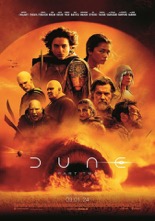
Starring: Timothee Chalamet
March 2024
Warning! This is NOT a movie review. This is a critique of the film. Intended to initiate a dialogue, the following analysis explores various aspects of the film and may contain spoilers. For concerns over objectionable content, please first refer to one of the many parental movie guide websites. Ratings are based on a four star system. Happy reading!
Previously on Dune: Paul Atreides (Timothee Chalamet) and his mother Lady Jessica Atreides (Rebecca Ferguson) set out across the deserts of Arrakis with Stilgar (Javier Bardem), Chani (Zendaya) and a host of nomadic Fremen.
Dune: Part Two picks up where the first film left off, with Paul and Lady Jessica learning the ways of the Fremen culture. One by one, Paul fulfills each part of an ancient prophecy, and though he’s reticent to accept such a mantle, the Fremen people revere him as their messiah (“Lisan al Gaib”). Things are also looking up for Lady Jessica, who becomes the new Reverend Mother for the Bene Gesserit sisterhood.
Meanwhile, the nefarious members of House Harkonnen are scheming to control all spice (mélange) production on arid Arrakis. When Rabban (Dave Bautista) fails to rout the Fremen, who are blowing up Harkonnen harvesters and spice depots with terrorist-style sneak attacks, Baron Vladimir Harkonnen (Stellan Skarsgard) commissions his brash nephew, Feyd-Rautha Harkonnen (Austin Butler), to find and destroy the Fremen stronghold to get spice production back on schedule.
When Padishah Emperor Shaddam IV (Christopher Walken) and his daughter Princess Irulan (Florence Pugh) arrive at Arrakeen, the major city on Arrakis, the board is set for a catastrophic battle between the Emperor’s Sardaukar soldiers, the Harkonnen army and the Fremen freedom fighters (and let’s not forget the giant sandworms).
So, who wins the massive melee? Do Paul and Chani tie the knot? Does Paul get revenge for the murder of his father, Duke Leto Atreides (Oscar Isaac)?
Well, you don’t expect me to ruin everything do you? (Of course, if you’ve read Frank Herbert’s titular tome, you already know the answers to these questions.)
As you’ve probably guessed from the title, this is the second movie based on Herbert’s sci-fi masterwork, which was first published in 1965. With the smashing success of the first Dune (2021), this sequel was all but assured. But does Part Two live up to the previous film?
Some of my main criticisms of the first film were that it’s expansive sets and gigantic ships made the characters seem insignificant by comparison and that the many frenetic ground battles felt impersonal since we really knew nothing about the soldiers charging into the fray. In Part Two, director Denis Villeneuve corrects these complaints by utilizing more closeups of the characters (especially the comely Irulan/Pugh) and by thrusting characters we’ve come to know (Paul, Stilgar and Chani) into the cataclysmic conflagrations. Villeneuve flips the script in several other key ways in the sequel.
For instance, much of the first film took place in and around Arrakeen (indoors). In this movie, most of the action transpires in the planet’s deserts (outdoors). In a similar vein, the first Dune focused on the Atreides family, while Part Two centers on the Fremen people (and Paul and Lady Jessica’s rise among their ranks).
Another contrast is that the first film’s narrative was infused with Machiavellian machinations (a few instances remain here, like when Baron Harkonnen plots his nephew’s demise, or when Princess Irulan manipulates her father into saving Paul’s life), while this film is more concerned with the Fremen culture and how they seek to become “one with the desert.” In essence, the political intrigue of the first film yields to the religious fervor of the second film.
The new cast members shine, especially Pugh and Butler. Walken, however, seems weak and doesn’t have the bearing of a galactic ruler. Bautista, who reprises his role as the Harkonnen henchman, continues to be underserved. In a paper-thin characterization, Rabban does little more than bark orders (“Kill them all!” and “Strike!”) and take out his frustrations on unsuspecting servants (a la Vader). Disappointing.
For all its divergences with the first Dune, this film shares some similarities as well. The movie’s design elements (ships, costumes, weapons, etc.) are all finely-crafted. Also, as with the former film, Part Two boasts some gorgeous sets and captures some stunning desert vistas.
Since Dune won six Academy Awards (for Best Cinematography, Editing, Score, Visual Effects, Production Design and Sound), the sequel seems poised to match or supersede that statuette haul.
At nearly 3 hours in length, Dune: Part Two is a protracted yarn that skillfully builds to the climactic battle, but disappoints with an abrupt ending.
The sequel is more intimate, yet less epic than the first film. Ironic!
Though this movie wraps up Herbert’s first book, will this be the last Dune adventure to grace theaters? Not if Villeneuve has any say in the matter. He’s expressed interest in adapting Herbert’s Dune Messiah for the big screen.
So, is a trilogy in the offing?
Keep your ear to the sand.
Rating: 2 ½ out of 4
Robots (PG)
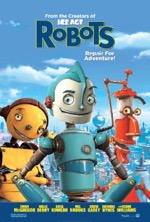
Starring: Ewan McGregor
March 2005
“Serviceable Story That Makes A Lot Out of Junk”
Robots is an astonishing clinic in computer-generated animation, the sleek vision of a fully realized synthetic world. This newest—and seemingly inevitable—iteration in CGI is crisper in its clarity and more vibrant in its palette than anything previously seen in the genre and has, effectively, risen the bar that much higher for Shrek 3 and other future movies of the same ilk. It’s evident that director, Chris Wedge (Ice Age), and crew were on a creative high assembling the nuts and bolts of the story, and though the flick is chock-full of dizzying action sequences, narrow escapes and drops and turns that make you feel like you’re on a roller coaster, the plot consistently lags behind the movie’s runaway pacing.
Rodney Copperbottom (voice of Ewan McGregor) heeds the call of the big city, leaving his parents and rural Rivet City behind to pursue his dreams of becoming an inventor in Robot City. Rodney immediately encounters Fender (Robin Williams, whose repertoire is getting repetitious), a vociferous misfit who falls to pieces any time the story calls for a laugh. Rodney’s first attempt at showing his invention to his boyhood hero, altruistic uber-inventor, Big Weld (Mel Brooks), is nearly disastrous as he narrowly escapes the clutches of greedy egotist, Ratchet (Greg Kinnear). Rodney learns, almost too late, that Ratchet supplanted Big Weld in a recent coup and has launched a campaign to beautify all of robotkind (and make millions in the process). Rodney’s ability to fix broken down robots transforms the small town droid into an urban legend, however, Rodney’s newfound fame poses a serious threat to Ratchet, who plans to destroy every spare part in the city, thereby forcing older models to get an upgrade. The climax pits Rodney and his army of rickety robots against Ratchet and his newer, larger, more powerful battle ‘bots. The ending ceremony is an emotional flourish—warm fuzzies soar like ticker tape—but the ensuing celebration is reminiscent of the one seen in Star Wars: Episode I—The Phantom Menace.
I mention Star Wars, because there are countless tips of the hat to (or blatant rip offs of) Lucas’ space saga, which surface at various times throughout the movie—the downtrodden underdogs marching against the evil overlords brings to mind Episode I and VI’s Gungans and Ewoks, respectively, and even Ratchet’s new robot sweepers look virtually identical to Episode I’s Trade Federation MTTs (battle droid carriers). Aside from Star Wars, Robots owes its metallurgical existence to The Wizard of Oz; motifs and archetypes from the perennial classic run rampant though the picture.
If there’s a rusty side to the seemingly chrome-plated screenplay, it’s the gimmicky manner in which the tale is told—much of the story is programmed with standard gags and slapstick silliness, especially Fender’s shtick. Robots, however, does have a salient moral: the conflict between the outmodes and the upgrades is a new spin on the old topic of intolerance—the devaluing of anyone or anything that doesn’t measure up to an imposed standard. In our nip-tuck, Botox-injected society, Robots reveals an insightful—even insidious—look at our own vanity and a sneak peek at where that brand of narcissism can take us. What a bold statement from an animated movie made in Hollywood!
Robots isn’t as funny as billed, but it’s a diverting romp with memorable characters and a positive message. Now we’ll have to see if there are enough spare parts to make a sequel.
Rating: 2 1/2
Evolution (PG-13)
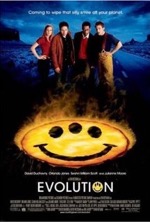
Starring: David Duchovny
June 2001
Phil Tippet’s unique creatures and solid acting performances by David Duchovny and Julianne Moore couldn’t bring Evolution past a primordial stage. You might even be disappointed paying the matinee price for this one.
Rating: 1 1/2
Titan A.E. (PG)
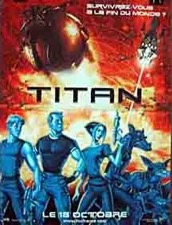
Starring: Matt Damon
June 2000
The science is appalling in this animated sci-fi flick, but the creativity is quite high—I especially liked the planet with hydrogen trees and the chase through the ice field. Ultimately, Titan A.E. fails to entertain even with the aid of stellar voice talents like Matt Damon, Bill Pullman, Drew Barrymore and Nathan Lane.
Rating: 2
Frequency (PG-13)
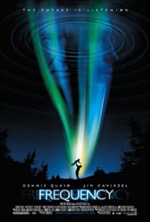
Starring: Dennis Quaid
April 2000
What a great movie! Frequency has a riveting, pulse-pounding plot and excellent performances by Dennis Quaid and James Caviezel as a father and son duo separated by time, but mysteriously connected by a HAM radio. Every time they alter history, a new set of variables come into play, creating more problems and ratcheting up the tension. This Murphy’s Law scenario is wildly entertaining—if not a bit far-fetched—and the ending twist makes you want to stand and applaud. The most enjoyable movie I’ve seen this year.
Rating: 3
Galaxy Quest (PG)
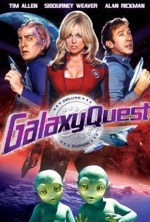
Starring: Tim Allen
December 1999
This good-natured spoof of Star Trek (specifically) and other sci-fi shows (generally) is a laugh-a-minute thrill ride that avoids ruffling the feathers of hard-core fans by never taking itself seriously. Tim Allen is flawless as Commander Taggart…he has Shatner’s strut and swagger down to a tee. In a memorable turn, Sigourney Weaver plays Lt. Tawny Madison, the communications officer who relays orders to the crew by repeating, verbatim, everything Taggart says…it’s her one job and she does it well. Tony Shaloub is absolutely hilarious as the incompetent engineer, Tech Sergeant Chen, and Sam Rockwell’s character, a no-name security officer who was killed off in Episode #81, is an obvious poke at Star Trek’s predilection for hurling red-shirted crewmen into harm’s way. Alan Rickman, as the Spock-like alien, Dr. Lazarus, paints the perfect picture of a once-serious actor who’s been typecast by legions of fans who clamor for him to recite his famous line: “By Gramthar’s Hammer…You Shall Be Avenged!” An exaggerated look at fandom and sci-fi conventions, Galaxy Quest features colorful characters, witty dialogue and excellent special effects: this is one exciting romp through outer space.
Rating: 3
Bicentennial Man (PG)
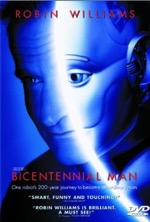
Starring: Robin Williams
December 1999
Bicentennial Man is a touching tale, which chronicles the decades-spanning journey of a robot in his quest to become human. Based on a story by Isaac Asimov and played to perfection by Robin Williams, the movie’s only downside is that it runs about twenty minutes too long. Sam Neill, Oliver Platt and Embeth Davidtz contribute excellent supporting performances.
Rating: 2 1/2